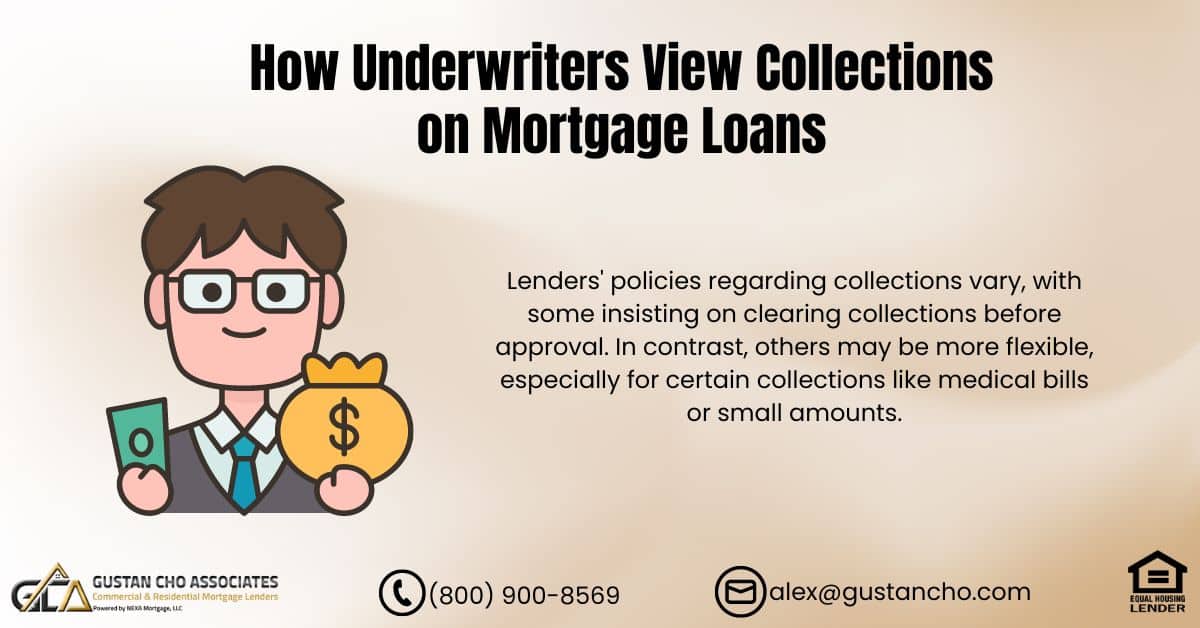This article will cover how underwriters view collections and charge-off accounts when reviewing a borrower for a mortgage loan. Homebuyers can qualify for an FHA loan with outstanding collections and charged-off accounts. How underwriters view collections and charge-off accounts depends the lender the mortgage underwriter works for.
If the lender has no overlays on collection accounts, underwriters are instructed to follow HUD agency guidelines but use underwriter discretion. How underwriters view collections and charged-off accounts normally is they do not require it to be paid.
However, with non-medical collections, underwriters will require 5% of the outstanding balance to be used as a hypothetical debt for debt-to-income ratio calculations.
In the following paragraphs, we will cover more on how underwriters view collections and charge-off accounts during the mortgage approval process. In the following paragraphs, we will be discussing the top frequently asked questions from our borrowers on how underwriters view collections and other derogatory credit tradelines while they are underwriting the file.
Qualifying for an FHA loan with outstanding collection and charged-off accounts. We will cover the difference between medical versus non-medical collections. We will also cover on qualifying for a mortgage with unpaid judgments and tax-liens.
HUD, the parent of FHA, has the most lenient guidelines when it comes to bad credit.
How Do Underwriters View Collections When Underwriting FHA Loans
FHA loans are the best mortgage loan program for borrowers with bad credit and low credit scores. The algorithm for HUD on the automated underwriting system with regards to bad credit is the most lenient than any other mortgage loan program. You can qualify for an FHA loan with credit scores down to 500 FICO. The maximum credit score on FHA loans for an AUS approval is 46.9/56.9 debt-to-income ratios.
Borrowers can qualify for FHA Loans with outstanding collection accounts. HUD, the parent of FHA, does not require you to pay off the outstanding unpaid collection account balances in order to qualify for FHA loans.
HUD, the parent of FHA, will count a percentage of any outstanding non-medical collection account balances. HUD requires mortgage underwriters to use 5% of the outstanding non-medical collection balance towards calculating borrower monthly debt to income ratios. This is only for non-medical collections. and medical collections are exempt. Speak With Our Loan Officer for FHA Mortgage Loans
What Does a Mortgage Underwriter Check?
A mortgage underwriter plays a crucial role in the approval process by assessing the borrower’s financial situation and the financed property. Here are the key areas that a mortgage underwriter typically checks:
- Credit History: The underwriter reviews the borrower’s credit report to evaluate their credit score, payment history, outstanding debts, and derogatory marks such as bankruptcies or foreclosures. A strong credit history demonstrates the borrower’s ability to manage credit responsibly.
- Income and Employment Verification: The underwriter verifies the borrower’s income through pay stubs, tax returns, W-2 forms, and bank statements. They also confirm the borrower’s employment status and history to ensure stable and sufficient income to support the mortgage payments.
- Debt-to-Income Ratio (DTI): The underwriter calculates the borrower’s DTI ratio, which compares their monthly debt obligations to their gross monthly income. Lenders have maximum DTI limits, and a lower DTI ratio indicates a lower risk of default.
- Assets and Reserves: The underwriter reviews the borrower’s assets, such as savings, investments, and retirement accounts, to assess their ability to cover down payments, closing costs, and future mortgage payments. Reserves refer to the amount of money the borrower has left after closing, which provides a cushion for unexpected expenses.
- Property Appraisal: The underwriter reviews the appraisal report to ensure the property’s value supports the loan amount. They also check for any issues affecting the property’s marketability or insurability.
- Loan Documentation: The underwriter examines all loan documents, including the loan application, purchase contract, title report, and disclosures, to ensure compliance with lending guidelines and regulations.
- Risk Assessment: The underwriter assesses the overall risk of approving the mortgage loan based on the information gathered. Factors like creditworthiness, income stability, property value, and loan structure are carefully evaluated to make informed decisions.
- Compliance and Regulations: The underwriter ensures that the loan file meets all regulatory requirements, including those set by government agencies such as FHA, VA, USDA, Fannie Mae, and Freddie Mac for conventional loans.
By thoroughly evaluating these factors, the mortgage underwriter determines whether the borrower qualifies for a mortgage and approves the loan based on the lender’s guidelines and risk tolerance.
Do Collections Count for Mortgage?
Collections can indeed impact your ability to secure a mortgage. When applying for a mortgage, lenders scrutinize your credit report to evaluate your creditworthiness. Collections on your report signal outstanding debts passed to collection agencies. These can significantly reduce your credit score, potentially leading to higher interest rates or even denial of your mortgage application.
Lenders’ policies regarding collections vary, with some insisting on clearing collections before approval. In contrast, others may be more flexible, especially for certain collections like medical bills or small amounts.
However, addressing collections positively, such as negotiating payment plans or settlements, can enhance your credit standing and improve your chances of mortgage approval with favorable terms. Improving your credit score and dealing with any outstanding debts is vital before you submit a mortgage application to boost your chances of approval.
Types of Derogatory Credit Tradelines
There are many types of derogatory credit tradelines mortgage loan applicants can have. Mortgage underwriters will analyze the type of late payments and the date of last activity when the last time the borrower was late. Below are the type of credit tradelines borrowers can have where the mortgage underwriter needs to determine the borrower’s regard for credit and history of payment.
- Non-Medical Collection Accounts
- Medical Collection Accounts
- Charge-Off Accounts
- Late payments
- Revolving account late payments in the past 12 months
- Installment account late payments in the past 12 months
- Mortgage late payment in the past 12 months.
- Judgments
- Tax liens
We can briefly discuss how mortgage underwriters calculate judgments and tax liens.
How Do Underwriters View Medical Versus Non-Medical Collections on FHA Loans?
Borrowers do not have to pay off outstanding collection accounts in order to qualify for an FHA loan under HUD mortgage lending guidelines. If outstanding unpaid collection accounts on non-medical collection accounts is greater than $2,000, the following rules apply:
5% of the outstanding collection balance is used as a hypothetical debt for debt-to-income ratio by underwriters. This only applies for non-medical collection accounts and not charge-offs.
Then 5% of the outstanding collection balances of all of the unpaid debts will be used in calculating monthly debt to income ratios. This holds true even though you do not have to pay anything to any creditors
Case Scenario on How Underwriters Calculate Hypothetical Monthly Debt on Collections
For example, if the total balances add up to $10,000 for all of your creditors and/or collection agencies: Then HUD requires 5% of the outstanding unpaid $10,000, or $500, to be used in calculating the borrower’s debt to income ratio.
If the outstanding collection balance is substantially large and the hypothetical 5% of the balance will disqualify the borrower, the borrower can enter into a written payment agreement with the creditor. The amount mutually agreed upon will be the amount used for the hypothetical collection debt in lieu of the 5%.
The $500 per month is a hypothetical debt. it does not need to be paid but will count as a monthly expense for borrowers. Any outstanding unpaid collection account balances under $2,000 that are non-medical collection accounts do not count in calculations of the borrower’s debt to income ratios.
Click here to get a loan with bad credit scores
Credit Disputes During Mortgage Process

Mortgage borrowers cannot have credit disputes on any charge-off accounts and non-medical collection accounts if the total of the outstanding collection account balances of all of your collection accounts is greater than $1,000.
Borrowers need to retract all non-medical credit disputes with outstanding collection account balances as well as all charge-off credit disputes before they are able to proceed with the mortgage application and mortgage approval process.
A pre-approval letter should never be issued if there are a lot of credit disputes on a borrower’s credit report. Retracting credit disputes drops the borrower’s credit scores.
Retracting Credit Disputes Will Lower Credit Scores
How much will retracting credit disputes drop credit scores? That depends on the type of credit disputed item but it can drop significantly. If a home buyer barely qualifies for a 3.5% down payment home purchase FHA Loan with the minimum 580 credit score required and needs to retract credit disputes, chances are that the borrower may no longer qualify.
Derogatory credit tradelines older than two years are exempt from retracting the credit disputes. Non-medical collections with zero balance do not have to be removed. If the total aggregate collection balance from all creditors is $1,000 or less, the credit disputes do not have be removed.
Borrowers with under 580 credit scores can no longer qualify for an FHA loan with a 3.5% down payment. This is because HUD requires the 580 FICO minimum. The mortgage loan officer will help borrowers in boosting credit scores back up after they retract credit disputes.
Credit disputes on non-medical collection items with zero credit outstanding balance are exempt. Paid-off collection accounts are exempt. Medical Collection accounts with outstanding balances are exempt from credit disputes and you can have credit disputes on medical collection accounts.
How Underwriters View Collections Versus Charge-Off Accounts
The great news is that HUD does not care about medical collection accounts with outstanding unpaid balances and charge-off accounts. They are not calculated in debt to income calculations of borrowers.
Most charge-off accounts will have a balance reporting on the borrower’s credit report. Mortgage underwriters ignore charged-off accounts.
5% of the outstanding balance due to the credit is used on non-medical collection accounts but NOT medical collections and charge-off accounts.
Underwriters will not use it for debt to income ratio calculations. As mentioned earlier, borrowers cannot have credit disputes on any charge-off accounts. Borrowers need to have the credit disputes on all charge-off accounts for your mortgage loan approval process to proceed.
How Mortgage Underwriters View Judgments
The way how underwriters view collections versus judgments are different. How underwriters view collections is to take 5% of the outstanding collections is used as a hypothetical debt in the even the collection turns into a judgment.
Borrowers can have outstanding judgments qualify for FHA loans: HUD requires borrowers to pay the outstanding tax lien and/or judgment or be on a written payment agreement.
The way how underwriters view collections versus judgments are different. Judgments need to be addressed before you can proceed with the mortgage collections. How underwriters view collections is a hypothetical 5% rule and not an actual like it is with judgments.
Borrowers with a judgment need to make a written payment agreement with the judgment creditor and show three timely payments have been made.
Lenders require borrowers to make three monthly payments on judgments.. You cannot make advanced payments of the three months of payments seasoning required.
Fannie Mae and Freddie Mac allow borrowers with judgments to qualify for conventional loans as long as they have a written payment agreement with the judgment creditor and made three timely payments. You cannot have outstanding judgments and qualify for a conventional loan.
Agency Guidelines Versus Lender Overlays
Unfortunately, most mortgage lenders will have additional requirements in addition to the minimum FHA Guidelines On Collection Accounts called FHA Investor Overlays. Most banks will require that you pay off all of your outstanding unpaid collection accounts in order for you to qualify with their institution even though it is not HUD Guideline to pay off your outstanding collection accounts.
Any collection accounts older than two years old really does not have an impact on your credit scores. Old derogatory credit tradelines that are older than 12 months are often not given too much weight by mortgage underwriters.
Paying off your older collection accounts will drop your credit scores This is because it re-activated your aged dormant collection accounts and re-activates them like it is recent activity. To qualify with a lender licensed in 48 states, including Washington, DC, and Puerto Rico with no overlays, please contact us at 800-900-8569. Text us for a faster response.
You can email us at gcho@gustancho.com. The team at Gustan Cho Associates is available seven days a week, evenings, weekends, and holidays to take your calls and answer any questions you may have. Click here to find a lender with no overlay
FAQ based on How Underwriters View Collections on Mortgage Loans
1. Can homebuyers qualify for an FHA loan with outstanding collections and charged-off accounts? Homebuyers can qualify for an FHA loan with outstanding collections and charged-off accounts. However, how underwriters view collections and charge-off accounts depends on the lender’s guidelines.
2. Do underwriters require collections to be paid off for FHA loans? Underwriters only sometimes require collections to be paid off for FHA loans, especially if the lender has no overlays on collection accounts. However, non-medical collections may require 5% of the outstanding balance for debt-to-income ratio calculations.
3. What are the differences between medical and non-medical collections for FHA loans? Medical collections are typically exempt from debt-to-income ratio calculations, while non-medical collections may require 5% of the outstanding balance to be considered in calculations.
4. How do underwriters view judgments and tax liens for FHA loans? Underwriters may require outstanding judgments and tax liens to be paid or be on a written payment agreement for FHA loan approval.
5. What are lender overlays on collection accounts? Lender overlays are additional requirements lenders impose beyond the minimum FHA guidelines. Some lenders may require borrowers to pay off all outstanding collection accounts even if it’s not a HUD guideline.
6. Do older collection accounts impact credit scores for mortgage approval? Collection accounts older than two may have less impact on credit scores, but paying off older collection accounts can sometimes temporarily lower credit scores.
7. How can borrowers qualify for an FHA loan without lender overlays on collection accounts? Borrowers can contact lenders with no overlays, such as Gustan Cho Associates, to explore FHA loan options without additional requirements on collection accounts.








